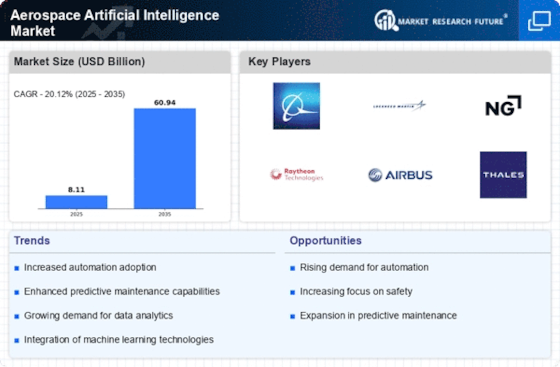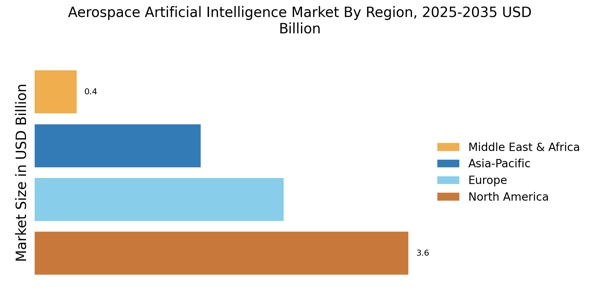Increased Demand for Efficiency
The aerospace artificial intelligence Market is experiencing a surge in demand for enhanced operational efficiency. Airlines and manufacturers are increasingly adopting AI technologies to optimize flight operations, reduce fuel consumption, and improve maintenance schedules. According to recent data, AI-driven solutions can potentially reduce operational costs by up to 20%. This trend is driven by the need to maximize profitability while minimizing environmental impact. As the industry faces pressure to meet sustainability goals, the integration of AI into aerospace operations appears to be a viable solution. Furthermore, the Aerospace Artificial Intelligence Market is likely to see continued investment in AI technologies that facilitate real-time data analysis and decision-making, thereby enhancing overall efficiency.
Advancements in Machine Learning
The Aerospace Artificial Intelligence Market is significantly influenced by advancements in machine learning technologies. These innovations enable the development of sophisticated algorithms that can analyze vast amounts of data generated by aircraft systems. For instance, predictive analytics powered by machine learning can identify potential failures before they occur, thereby enhancing safety and reliability. The market for machine learning in aerospace is projected to grow at a compound annual growth rate of over 15% in the coming years. This growth is indicative of the increasing reliance on data-driven insights to inform operational decisions. As machine learning continues to evolve, its applications within the Aerospace Artificial Intelligence Market are expected to expand, leading to more intelligent and autonomous systems.
Regulatory Support for AI Integration
The Aerospace Artificial Intelligence Market is benefiting from increasing regulatory support for the integration of AI technologies. Regulatory bodies are recognizing the potential of AI to enhance safety and efficiency in aviation. For example, recent guidelines have been established to facilitate the use of AI in air traffic management and autonomous flight systems. This regulatory framework is crucial as it provides a structured approach for the safe implementation of AI solutions. The Aerospace Artificial Intelligence Market is likely to see accelerated growth as companies align their innovations with these regulations. Furthermore, the collaboration between industry stakeholders and regulatory agencies may foster a more conducive environment for AI adoption, ultimately leading to improved operational standards.
Emerging Applications in Defense and Security
The Aerospace Artificial Intelligence Market is witnessing a growing interest in AI applications within defense and security sectors. Governments and defense contractors are increasingly leveraging AI technologies to enhance situational awareness, improve decision-making, and optimize resource allocation. The integration of ai in military aviation, such as autonomous drones and surveillance systems, is becoming more prevalent. This trend is supported by the increasing defense budgets allocated to advanced technologies, which are projected to rise significantly in the coming years. As nations prioritize national security and technological superiority, the Aerospace Artificial Intelligence Market is likely to expand, driven by the demand for innovative AI solutions that enhance operational capabilities in defense.
Growing Investment in Research and Development
Investment in research and development is a key driver of the Aerospace Artificial Intelligence Market. Companies are increasingly allocating resources to explore innovative AI applications that can transform various aspects of aerospace operations. This trend is reflected in the rising number of partnerships between aerospace firms and technology companies, aimed at developing cutting-edge AI solutions. Recent reports indicate that R&D spending in the aerospace sector is expected to reach several billion dollars annually, underscoring the commitment to advancing AI technologies. As these investments yield new breakthroughs, the Aerospace Artificial Intelligence Market is poised for substantial growth, with the potential to revolutionize areas such as predictive maintenance, flight safety, and operational efficiency.

















